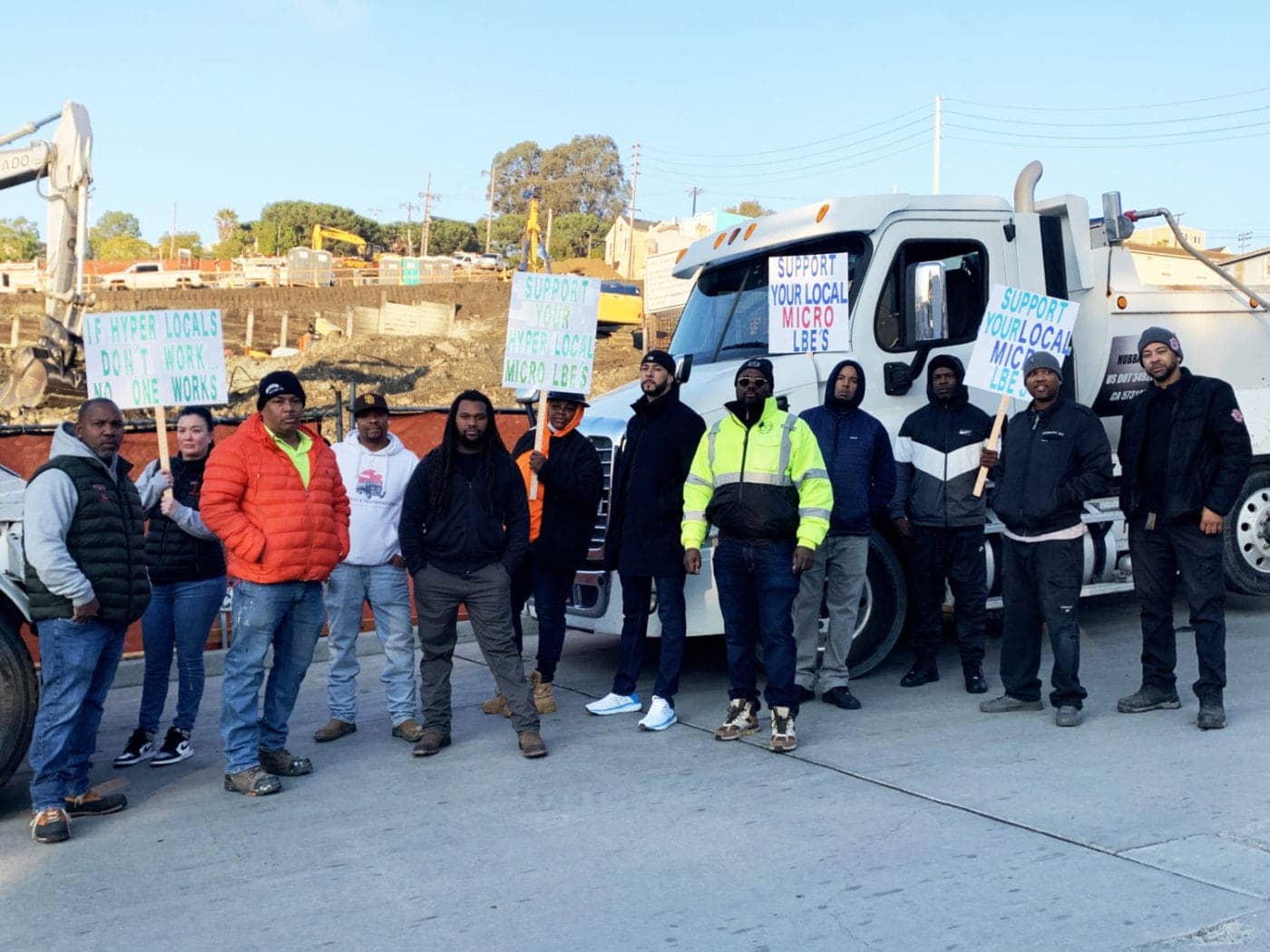
by Nube Brown and Mary Ratcliff
“I’m a contractor, I want to be a contractor. I do an excellent job. In spite of the fact that I’m small, I’m growing every day. But everything is a fight, and it shouldn’t have to be.” LaSonia Mansfield of Mansfield Construction Clean-up Co. is a brave woman – brave enough to own her own business in an industry that’s nearly all owned and controlled by white men, the old boys’ club, and brave enough to turn out at 7:00 a.m. on a cold Dec. 14 morning with other Black contractors and truckers to shut down a construction site on Potrero Hill at 26th & Connecticut to demand a fair share of the work.
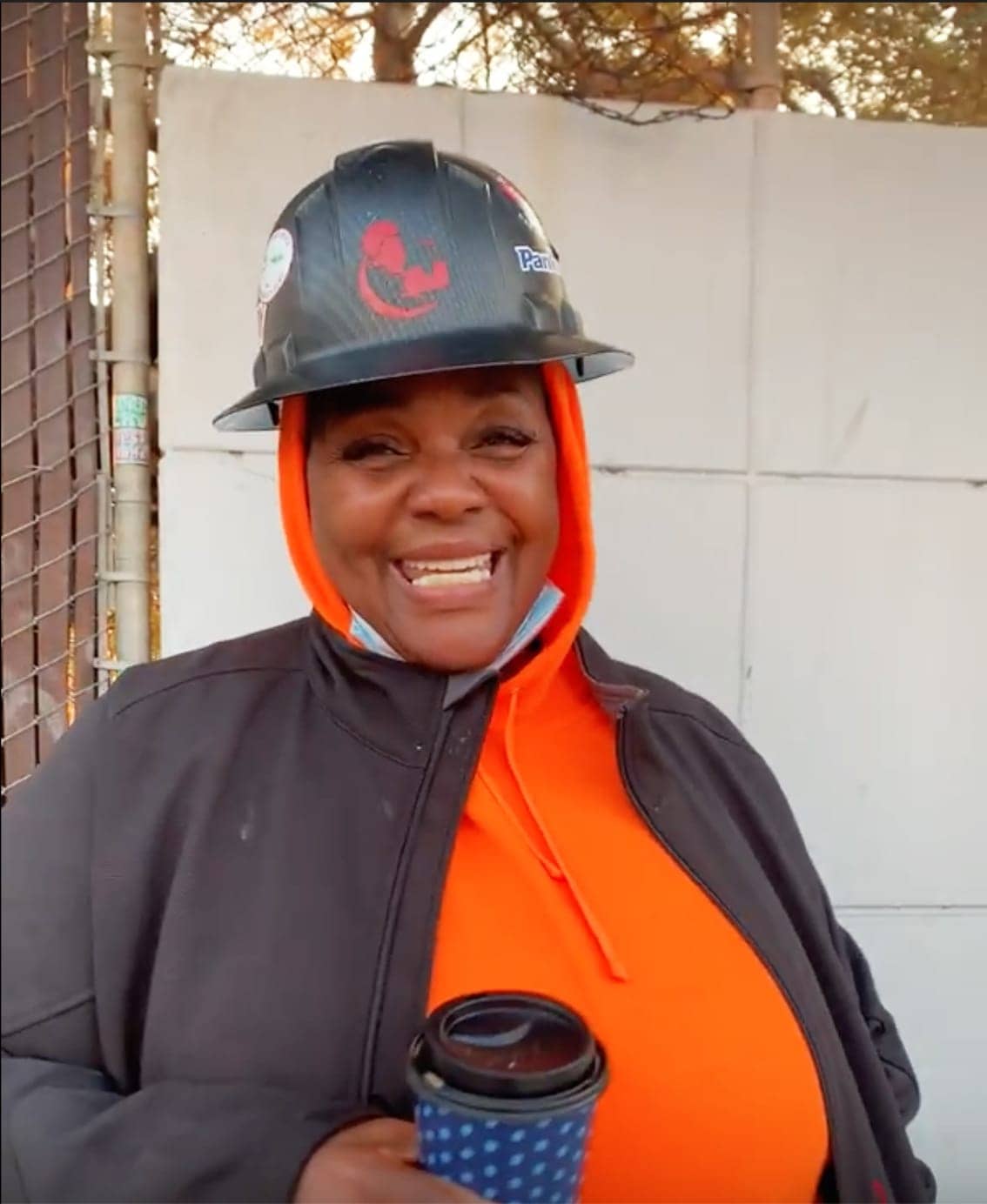
Construction pays! A laborer, a job that requires no training or experience, is paid $30 an hour, a cement mason $49, a roofer $65, a painter $75 – and that’s by law on public works construction projects, all the projects that come through City Hall. A trucker’s big rigs come with huge expenses, but they too can make good money – if only they can get the work.
So construction jobs are worth fighting for. Your academic record, police record or prison record doesn’t count if you’re willing to work hard and smart and you can find a Black contractor who’s willing and able to give you a chance to learn a trade. And with a few years experience, you too can become a contractor and put your community to work.
In Black Hunters Point, construction work is a long, deep tradition. Once the door was opened back in the ‘60s by the Big Five, powerful women leaders who demanded decent housing, all that HUD housing they won was built by Black contractors and workers. Over the years, Blacks became such a competitive threat in San Francisco’s construction industry that in 1998, 25 years ago this August, a noose was hung on the SFO jobsite of Liberty Builders, owned by Dr. Willie Ratcliff, who also publishes the Bay View. That noose signaled a lockout of Blacks from construction that continues to this day.
“We can’t feed our families and we can’t support our community if we’re not working. It’s Christmas time. We should be working too,” declared Keith Smith, owner of Global Team Corp., a trucker since 2005 and one of the Black truckers whose big rigs were blocking the entrance to the Potrero Hill jobsite. The white contractors and truckers hired by the general contractor, Cahill, were lining up wondering if they’d be going to work.
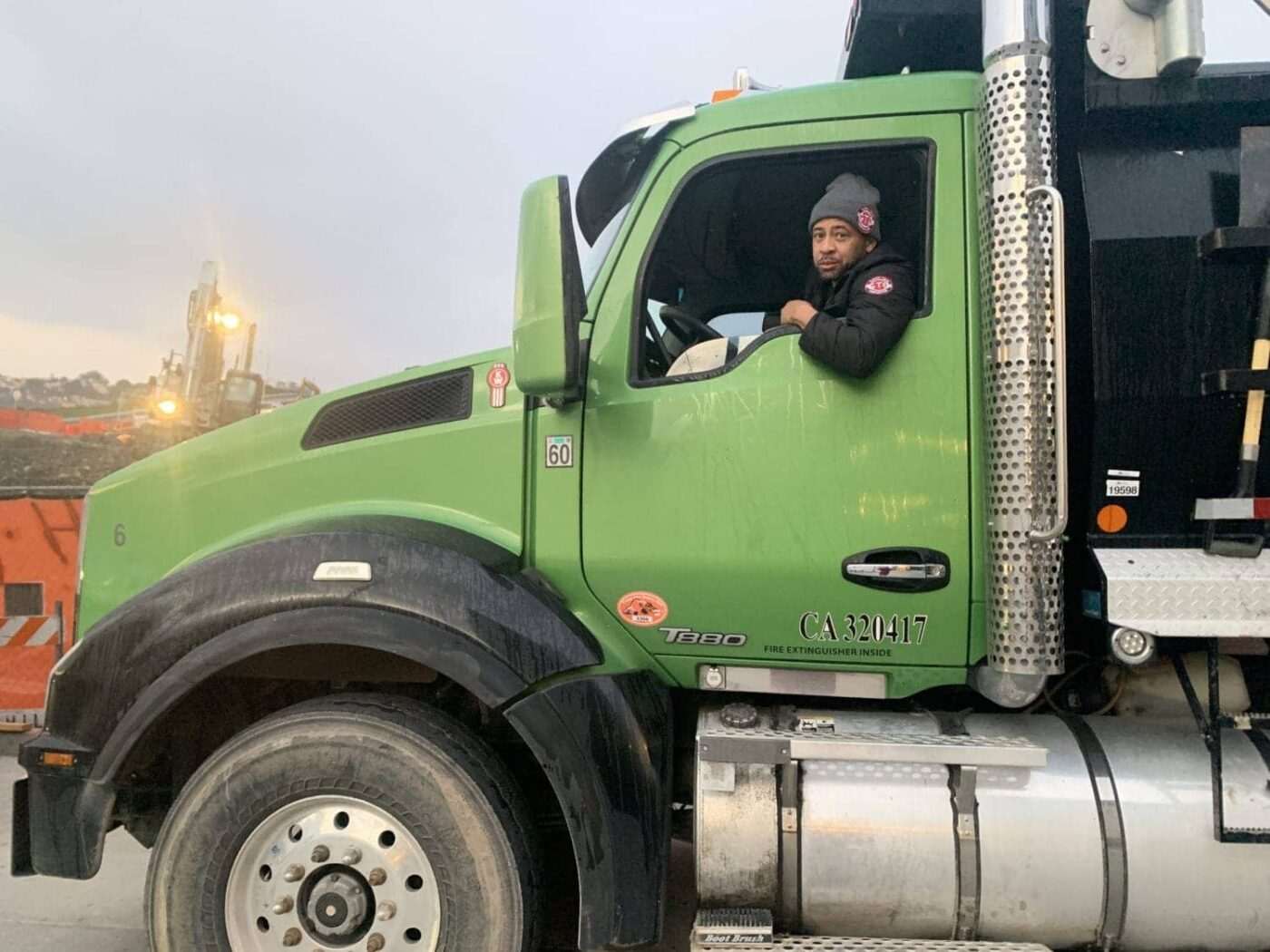
“I’m here supporting my local truckers, my local contractors,” asserted HVYW8 Trucking’s Michael Gregory, who also heads the African American Construction Collective, which organized the shutdown. “This has been a brewing situation. Local contractors have been at the table with Cahill letting them know that when you come into this community, it’s important that you hire Black contractors; it’s important that you hire Black truckers. This is our community, and if we can’t go to work in our community, how can we let others come and funnel the money out of the community?”
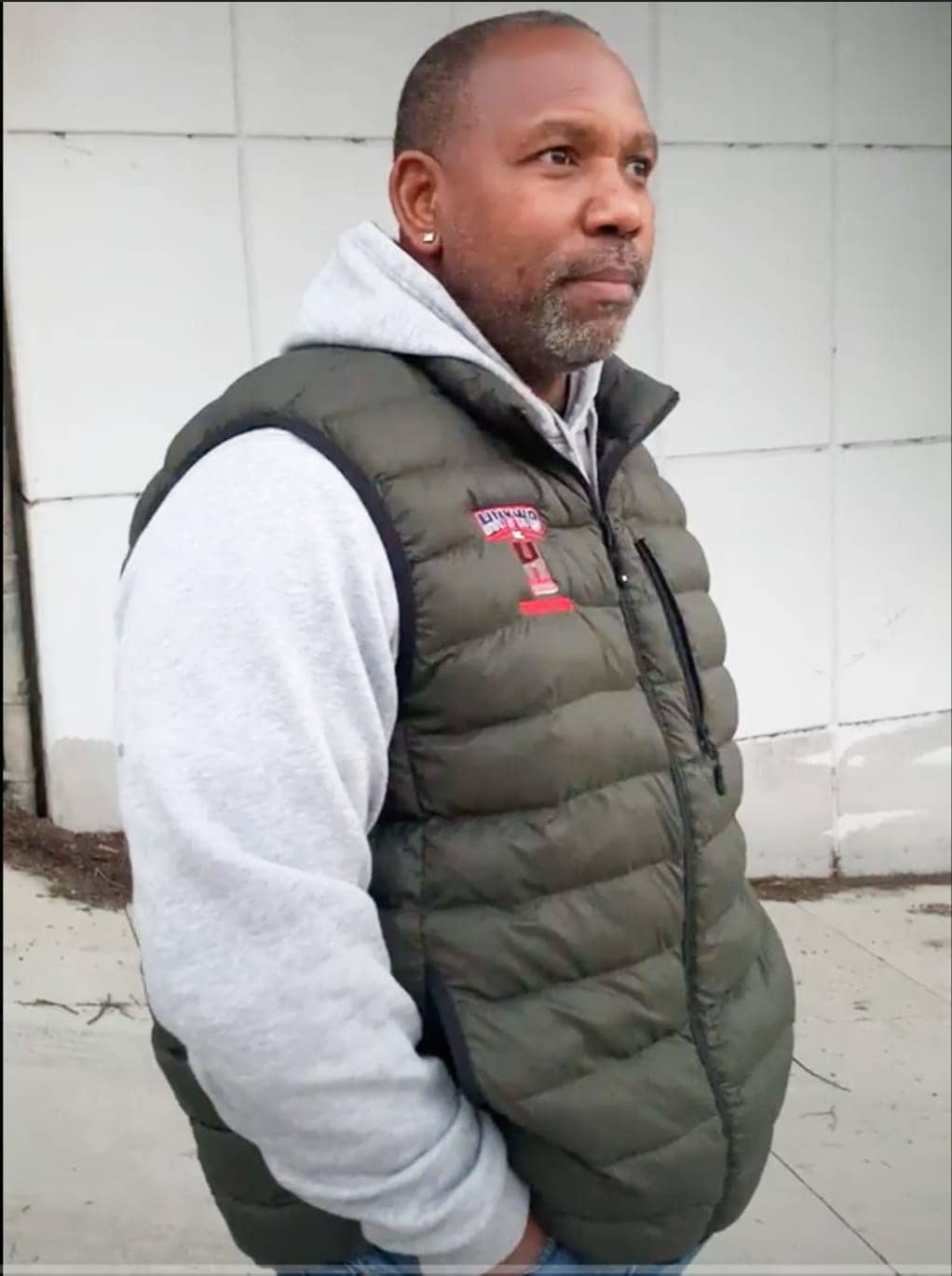
Cahill Contractors, which reports $334 million in annual revenue, is the general contractor for the rebuilding of what used to be public housing on the steep Potrero hillside. Cahill is working for BRIDGE, the developer given control of that portion of San Francisco’s once vast public housing resource. Still, this is not a private construction project but a public works (government financed) project, and there are laws requiring a level playing field for contractors competing for the work in their trades.
“We’re a union contractor here in San Francisco not even 10 minutes from here,” said Triston Dion, owner of Streamline Drywall. “We’ve been trying to get our foot in the door with Cahill for about four or five years. I’ve gone through the pre-qualification process. I’ve bid multiple projects.
“We’ve had an extremely challenging ride for six or seven years now. We were just talking about other contractors on other developments that do not treat us fairly. If we make any kind of noise about it, we’re often blackballed,” warned Dion. San Francisco has lost many promising Black leaders as blackballed Black contractors, truckers and construction workers have been pushed out of the city while the Black population has dropped from 13% to 5% or less.
“The reason I’m out here,” said LaSonia Mansfield, “is because Cahill, along with Silverado and a lot of general contractors (GCs), continually leave us out. They allow us to bid, to use our resources, to spend our money, to submit bids, but they never give us a bid.” To translate that contractor talk, Mansfield is saying that despite the major time and expense and expertise it takes to prepare a bid, the price the contractor commits to do the work for, the general contractors almost never sign a contract with small Black contractors. “Nor do they ever give us the results of the bid,” she said, which is where fraud can creep in; maybe the successful bidder wasn’t the low bidder. “They typically go with their own people,” the subcontractors they have used in the past.
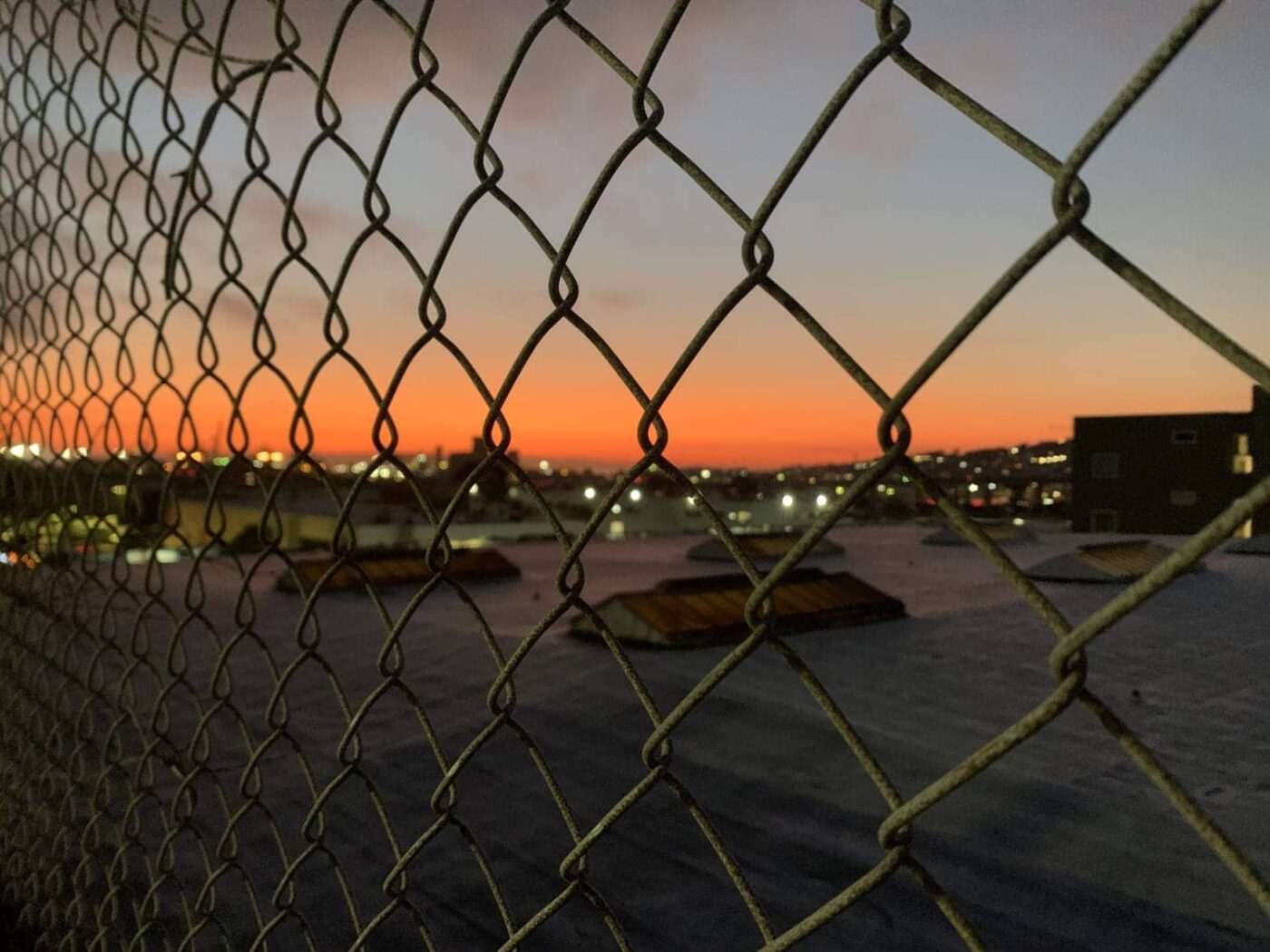
“San Francisco is supposed to be committed to a ‘San Francisco first’ policy, and we’re not getting that,” Mansfield protested. “I’m a contractor, an African-American woman running a family-owned construction clean-up business. The biggest thing I’ve been fighting for along with my business is putting the community to work.
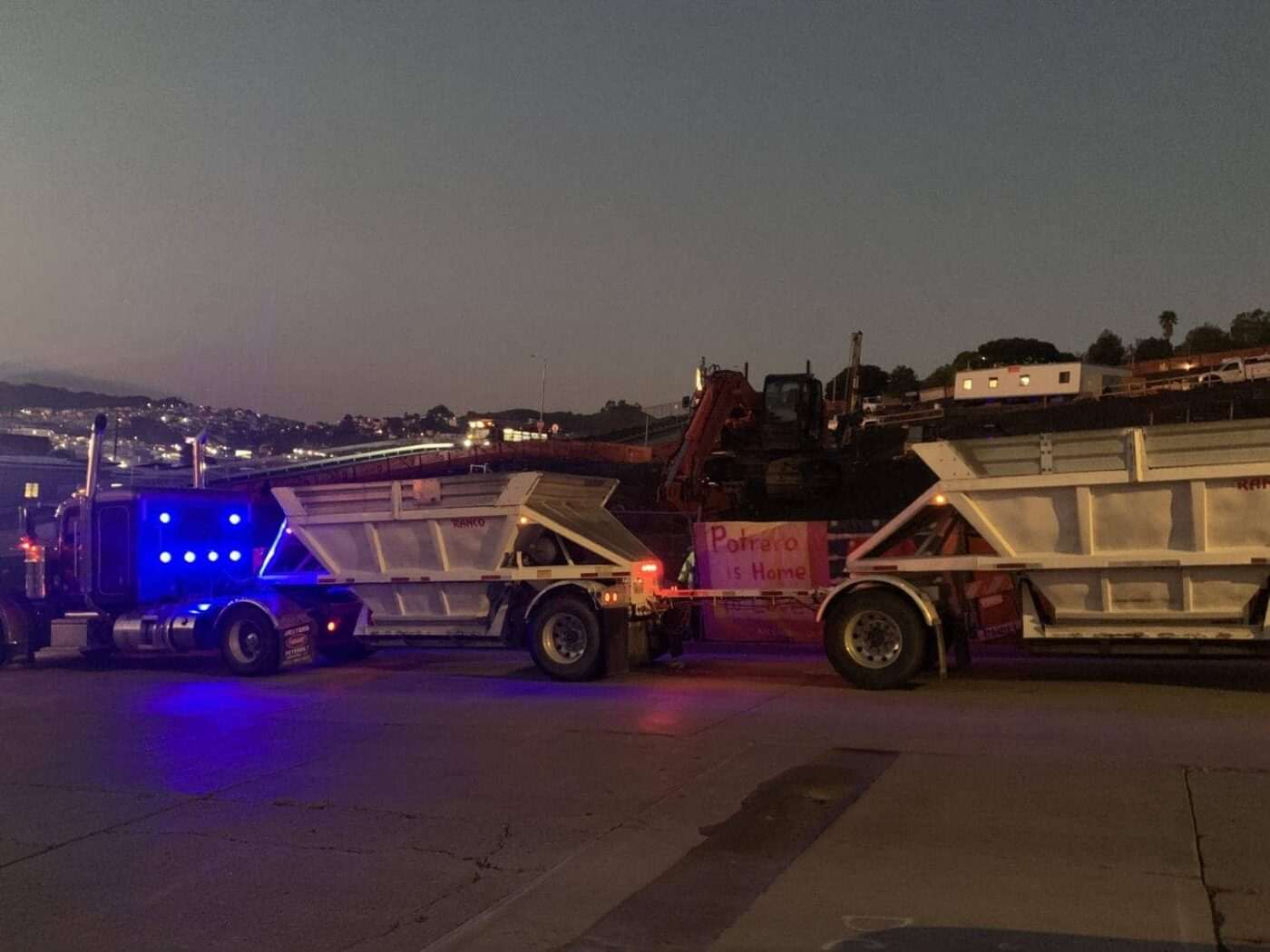
“We’ve personally sponsored over 20 community members into the union,” Mansfield said, “so that they can have a living wage making between $29 and $33 an hour. Oftentimes the community feels more comfortable working with people that are relatable, that won’t use their zip codes to get a discount, then fire them a month later.” She’s referring to the minimal enforcement of the City’s Local Hire policy that gives companies incentives for hiring workers from Black neighborhoods, but those workers are often let go soon after the inspector leaves.
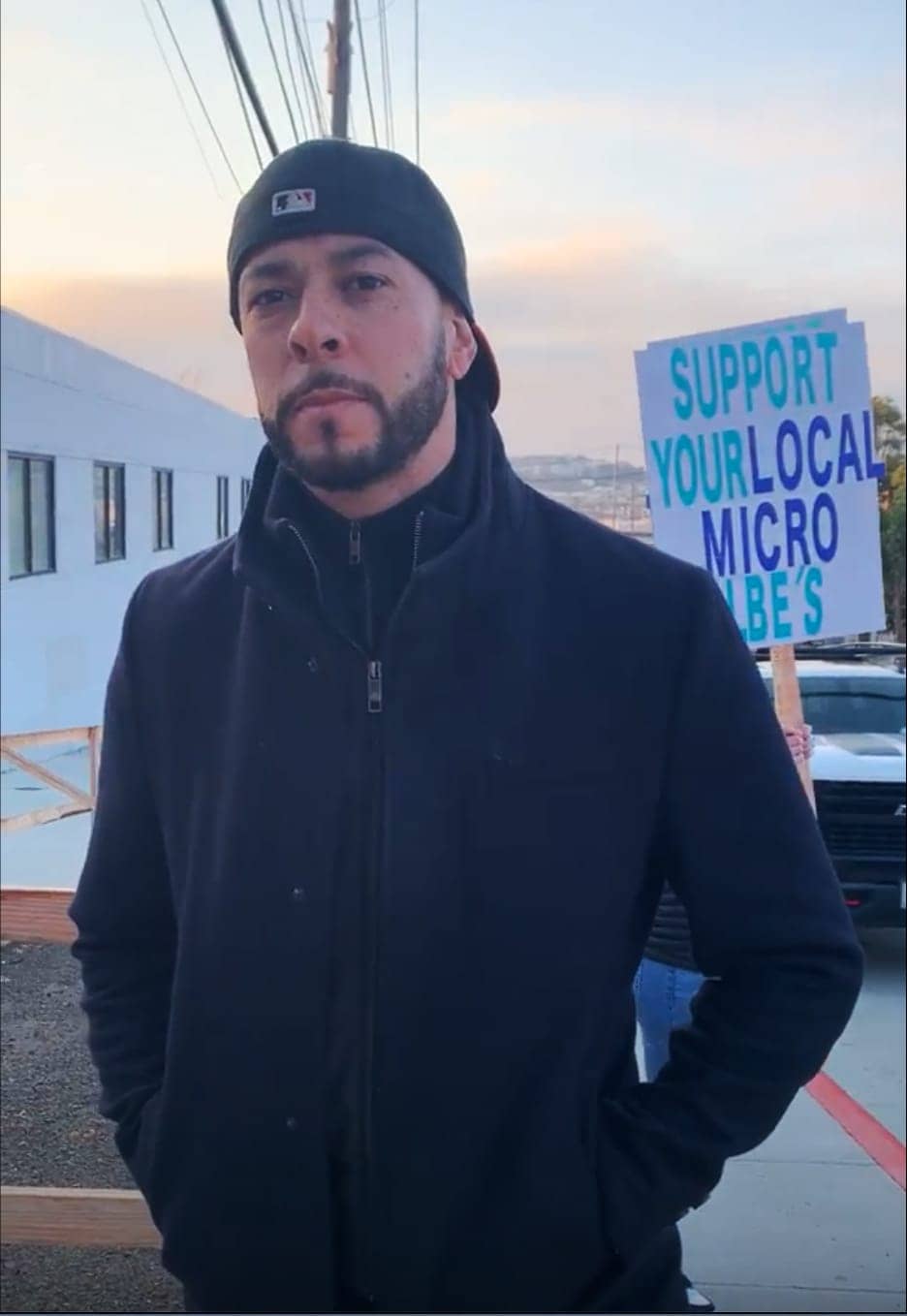
“I’ve been in the trades for over two decades,” added Triston Dion. “I’ve worked with bigger union contractors so I’ve seen both sides. I’ve seen what it’s like on that side of the fence and what it’s like on this side – and these scales are completely imbalanced. Even with economies of scale factored, with the small and micro business, our insurances alone are easily … 10 times more than Cahill’s, so just that as a baseline, the scales are already extremely imbalanced, so there’s definitely a lot of things that need to be rectified to help level out the playing field. It’s been going on like this for decades.”
“What’s happening with us is that we’ll get invited to bid,” explained James Mabrey, a contractor with substantial experience, “and it seems like our numbers are shopped around,” i.e., competitors are told the Black contractor’s bid, so that they can slightly underbid and get the work. “And then we check the list of subcontractors. Most of the GCs are listing the same subcontractors over and over again except for us. We might get one project with a GC, and then the next project he might list the same sub (he was using before) for the same scope of work, maybe four or five given times. It’s just transparent. It’s right there; you can see it.”
“We’re here today,” Mabrey continued, “as a coalition of micro subcontractors in the San Francisco Bay Area to protest these GCs, these primes, getting awarded projects and really not including us – trying to collude with other general contractors to keep us out, which is really not the way the legislation is written. It requires every project to have a certain percentage of micro local subcontractors involved with government funded housing projects.”
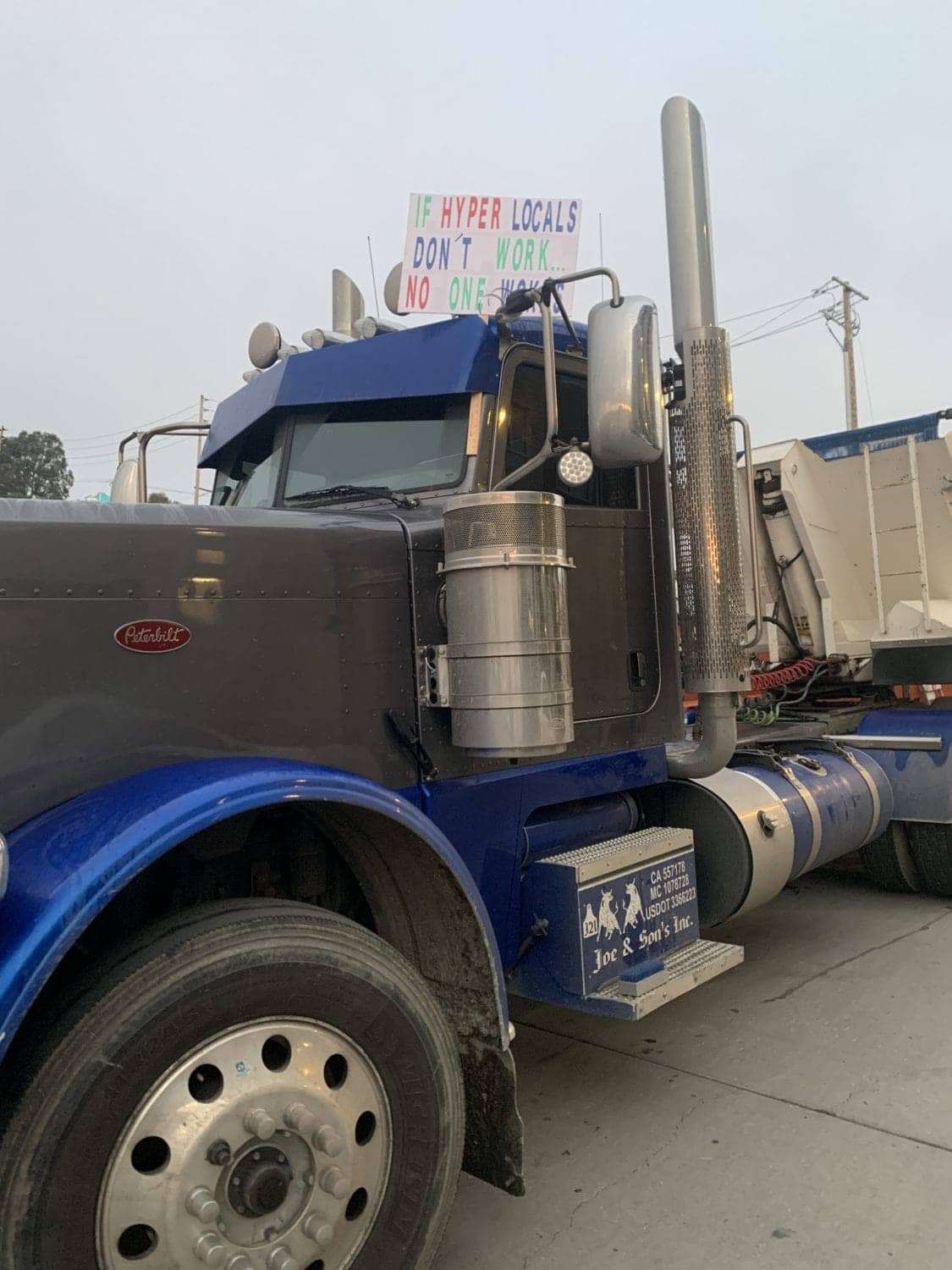
No matter how clear the law is, Blacks remain locked out of most construction work in San Francisco. One reason is that the preferences in the law meant to assist contractors from disadvantaged neighborhoods are sometimes extended to contractors who don’t live there or are not truly headquartered there. Michael Gregory explains why the protesters call themselves “hyper-locals – us that’s really from here, not us that got an office here, that have been here and acting like they’re really from this community and trying to benefit from it. We’re talking about the ones whose mothers live here, whose fathers live here, whose grandparents live here, whose kids live here. Not the ones who just come in for the money grab; we’re talking about us who’s really from here.”
Walter Stokes of Joe & Sons, Inc., is a good example: “I’ve been born and raised here. My family’s been here since the ‘50s so we’re actually true locals, and what we’re here to make a statement about today is actually true locals going to work, true business entities from the community going to work.
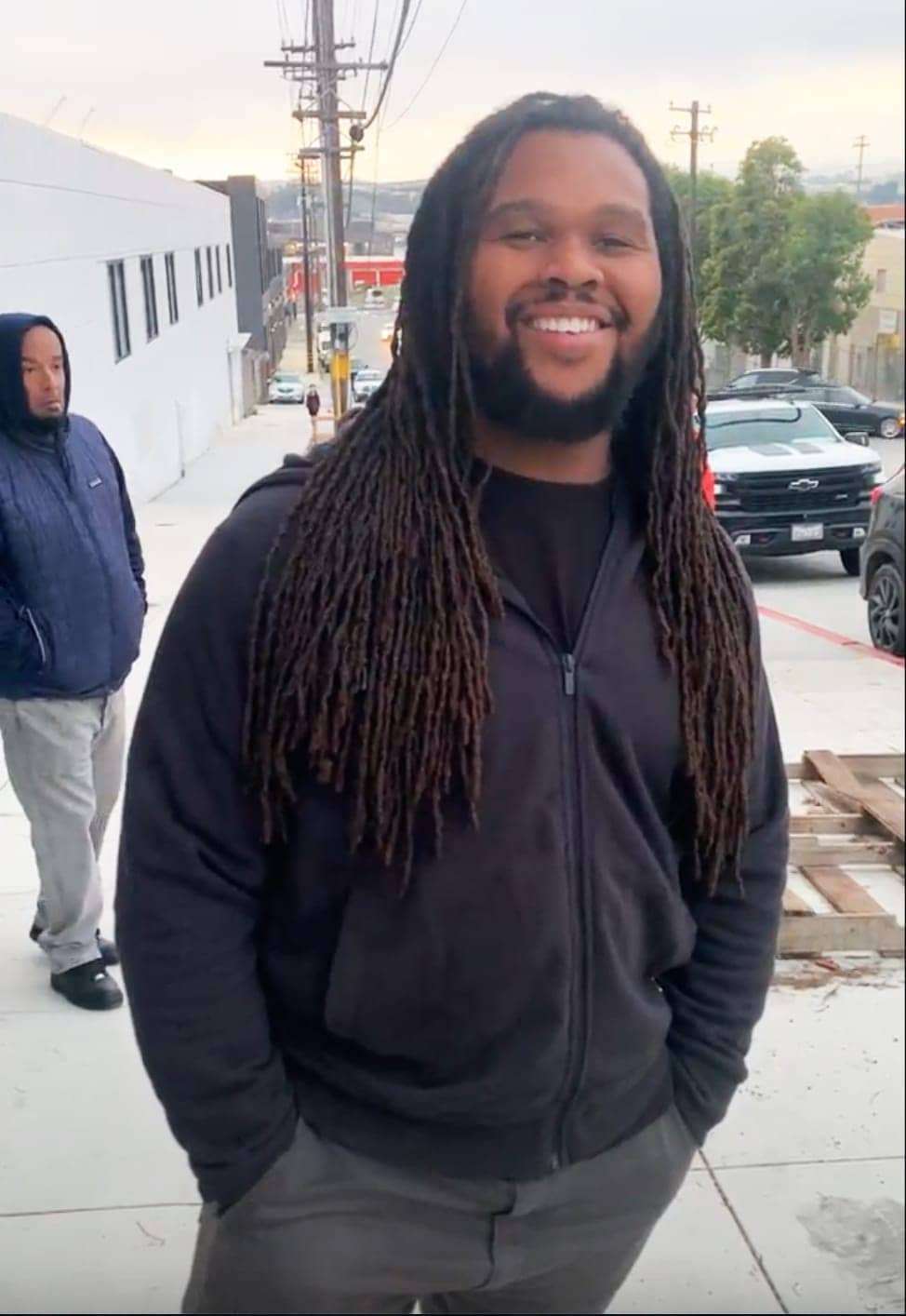
“There’s no reason why the City of San Francisco should continue to allow outsiders to come in; they come in and they milk it. They take the money and they run. They’re not putting back into the community. They have no involvement, no investment into the community. We do. So we should be the ones going to work.
“I’m a second generation trucker,” Stokes said with pride. “My father trucked in this community when Third Street was only one lane going each way. That’s how invested and how much we’ve been in this community. So Joe & Sons is actually about legacy. I have two boys that hopefully can continue the empire as it grows. So legacy is very important.”
Describing the endless barriers that lock Black contractors out, LaSonia Mansfield said: “We get certifications – LBE, DBE, WBE, MBE, SBE (meaning Local, Disadvantaged, Woman, Minority and Small Business Enterprises); we’re tasked by the City and County of San Francisco to have these certifications in order to get jobs. We keep our warehouses. We pay for our storages. We have huge amounts of insurance that we pay for. But then we can’t get the jobs – in our own community.
“The data is there. We’ve been underutilized and given crumbs when there’s billions of dollars coming through our community.”
“And I think that’s the most painful thing is to get up every day and watch other people come into the city and into our community, get work, be able to buy homes, pay for their kids to go to college, and then we’re still out here struggling on Section 8 or low-income housing. It’s just not acceptable and it’s time for us to step up and just say, ‘Not today! No more! We’re gonna fight for ours!’”
Added James Mabrey: “Because there are more projects that are like this to come, we want to set a precedent that we can’t have this in our community. This is the way we feed our kids, our families, and we want to send our kids to school and let them inherit our businesses as well. That’s the point of all of this. We’re just putting in the groundwork. This has never been done before so we’re maybe the first generation to actually take it to this level.”
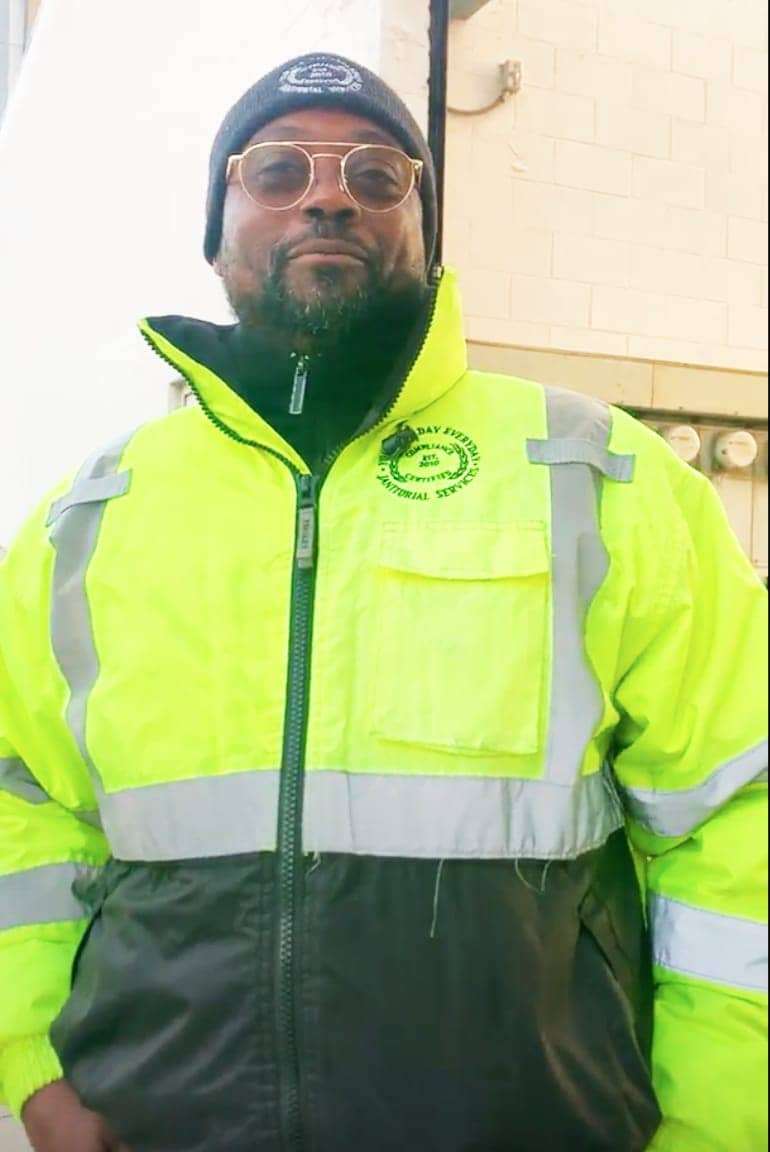
Asked how the residents of Potrero or Sunnydale can support Black contractors and truckers, Mabrey advised: “Come together as residents in unity to require, when they’re rebuilding in your communities, that they hire local businesses, that it’s a must. … If the community comes together like we’re coming together here and starts community committees to say, ‘OK, if you can be building in our community, then you’re gonna have to use our local subcontractors in building businesses that are here.’ And they’re coming together, and when we all come together, we’ll start making things happen.”
Mabrey summed up the problem: “The data is there. We’ve been underutilized and given crumbs when there’s billions of dollars coming through our community. Those dollars are supposed to be spent with the local businesses hiring the local residents.”
How can City Hall be convinced to enforce the laws requiring a level playing field and end the lockout of Blacks from construction? And can it be done before another generation of Black truckers and contractors is pushed out of San Francisco? “There is a lot of movement that’s going on right now, but I do feel that things need to progress a lot quicker before a lot of us businesses are no longer in existence,” said Triston Dion of Streamline Drywall.
“There’s been a coalition of micro LBEs who have put together letters, who have gone to the city administrator, Carmen Chu; we’ve been having a lot of discussions. There is movement and they’re aware of what our problems are, but as far as finding solutions and getting things done sooner than later, we’re in dire need,” said Dion emphatically.
Added LaSonia Mansfield: “I know Carmen Chu’s office is working on it but we passed LBE legislation over a year ago which was supposed to go into place July 1 for micro LBEs; and to this day, everyone else has received the new laws and the benefits of the new laws but the micro LBEs haven’t.”
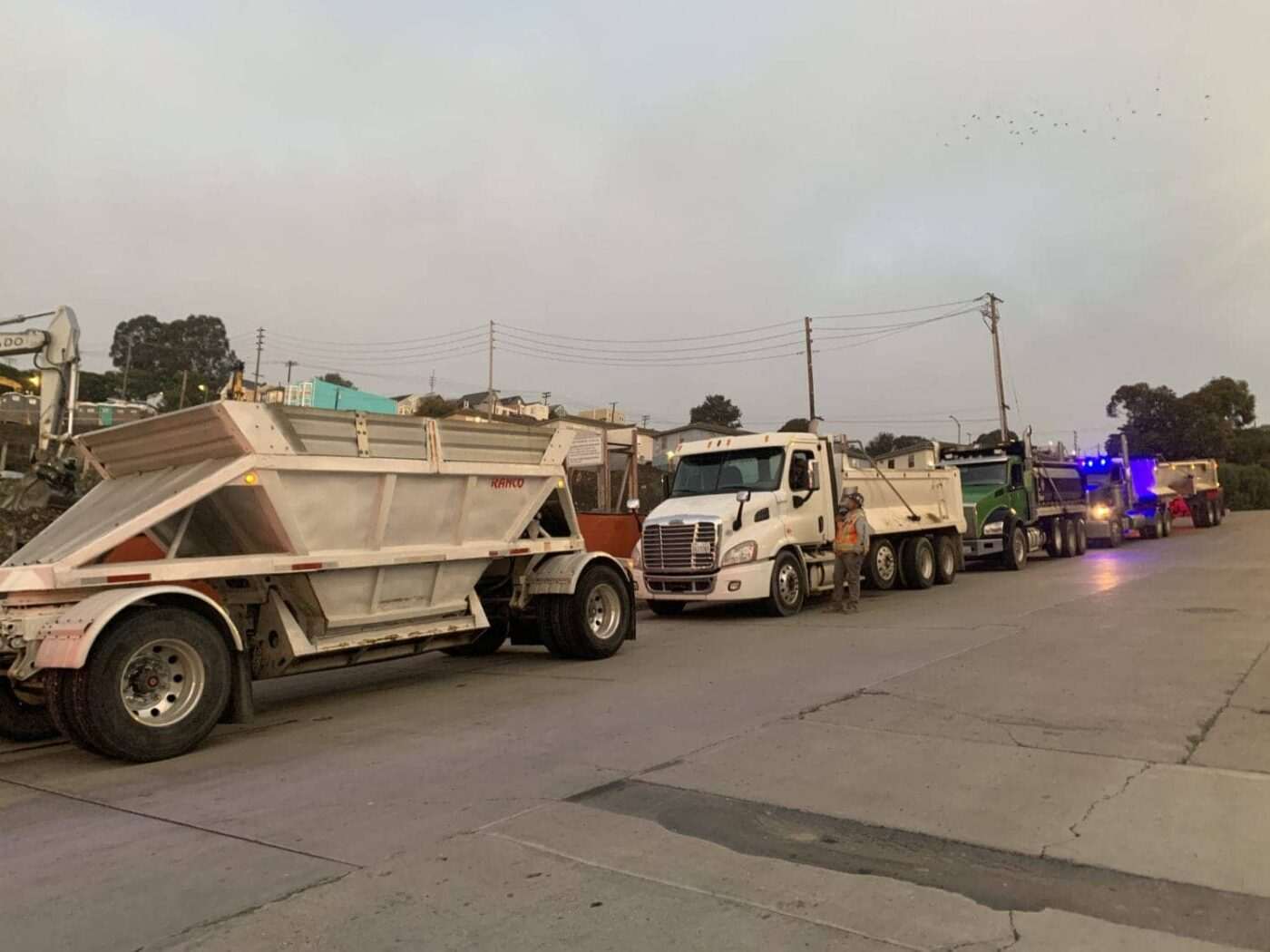
James Mabrey cautioned that even well-intentioned administrators may be hampered by insufficient budgets: “The CMD (Contract Monitoring Division) is basically short-manned. They don’t have the staff to watch each and every project. That leaves us vulnerable. So we’re here today – because they said that they can’t be here – and we’ll bring this information, this footage, back to them to show them really what’s going on.”
Walter Stokes wrapped it up: “Hopefully we can get people in place, in power, who actually want to see change to step up. CMD (Contract Monitoring Division), down at the mayor’s office, down at City Hall, anybody who has the power to make a change, I’m calling them to step up – to come and actually do their job and attempt to make a change so this doesn’t have to happen.
“We don’t want to be out here doing this, but we have to. We’d rather be working.”
When we fight, we win!
In a call at press time, Michael and Tricia Gregory report that Cahill has been sitting down with the African American Construction Collective to discuss inclusion of its members in the Potrero project. The work most of the members do starts later in the construction process. It’s the excavators and the truckers who are first on the jobsite – and right now HVYW8 Trucking is on the job! “This is a huge win for the Black contractors and truckers,” exclaimed Tricia.
This story is a collaborative effort by Prisoner Human Rights Editor Nube Brown, who showed up on the jobsite at dawn to record the interviews and photos, and Mary Ratcliff, publisher and editor emeritus, who brings her essential and personal history – and expert writing skills to the story. Both know that without meaningful work, there’s prison. Liberty Builders financed the SF Bay View newspaper for years, and then-Mayor Willie Brown’s decision to put the Black contractors out of business in 1998 was also aimed at putting the Bay View out of business. But still we stand to tell stories like this one. Special shoutout to Sophia Chupein for her stellar transcribing skills. Read “Black truckers shut down multi-million-dollar UCSF job site for 4.5 hours” by Bay View Staff (Griffin Jones) May 2021.





